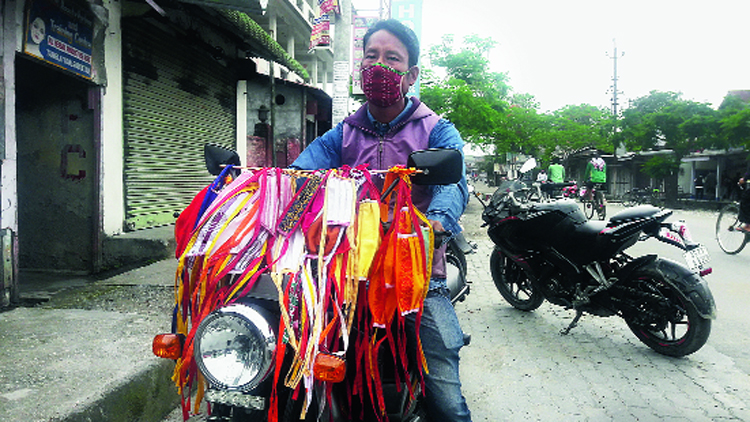A young Bodo couple in Assam’s Udalguri district are making cloth masks out of Assamese gamosas, Bodo aronai and Rabha kangbang, traditional towels of the indigenous communities, and selling them door-to-door to earn a living amid the Covid-19 pandemic.
Brojen Daimari and his wife Rumi, in their mid-thirties, were struggling to sustain themselves owing to financial constraints and decided to make the distinctive and flamboyant masks out of traditional towels of indigenous communities, which are in vogue among the people of Assam.
While Rumi tailors the masks to perfect shape and size, Brojen, riding his TVS 100cc motorcycle, goes out to sell them.
The masks are placed on a horizontal stick above the headlight of his bike to catch the attention of passersby.
“The government has made wearing of masks and social distancing compulsory to prevent contracting Covid-19. My wife and I observed that masks are not easily available in rural areas. Moreover, the ones available in medical stores are being sold at a much high rate. So, we decided to make use of the growing demand for masks and make the cloth ones,” said Daimari.
“We were facing trouble as the stationery shop in the village had downed shutters for days and after that, we decided to start this business,” he added.
Daimari said he travels to various parts of Udalguri district, including Khoirabari, Bhergaon, Dimakuchi, Paneri and Tangla and manages to sell 60-80 pieces every day at the rate of Rs 50 each.
Asked if he faced trouble from law-enforcement agencies, he said, “I only sell them from 8am to 1pm as an administrative official suggested that I adhere to these timings. Sometimes, I am stopped by the police but after I say that I consulted the local circle officer, they let me go.”
Guwahati-based textile researcher Jayanta Dev Sarma said, “Fabrics like cotton, silk and wool have anti-viral and anti-bacterial qualities. Such fabrics can do wonders when treated with some anti-microbial plants. Boiling neem, tea, basil (tulsi), turmeric (haldi), mint pudina), bark of pomegranate, aloe vera and honey in water for sometime makes the solution an active disinfectant. Masks and any other clothing when dipped into this water can be disinfected. When a piece of gamosa is soaked in this boiled water, it can be a more effective mask than some of the ordinary masks available in the market, which are now being sold at a much high price.”
“The use of gamosas is quite in sync with the culture of Assam. People distributing prasad in naamghar, covering their mouths with gamosas, is a common sight. Using gamosa masks to prevent viral infection, including novel coronavirus, can be an extension of its use in all activities, apart from cultural ones,” he added.











